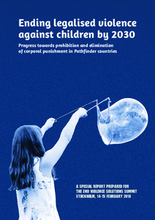Displaying 81 - 90 of 130
This study examined the relationships between adults, ages 25-39, who had been in care as children and their birth parents.
The aim of this article is to study child welfare workers' individual and collective experiences of and expectations about their occupational role and responsibilities in their administrative and relational work with children and youth in foster care.
Prepared for the Agenda 2030 for Children: End Violence Solutions Summit, held in Stockholm, Sweden, on 14-15 February 2018, this report tracks progress towards prohibition and elimination of corporal punishment of children in Pathfinding countries.
The Global Partnership to End Violence Against Children, and partners, are issuing an urgent call to action, bringing together governments, the UN, civil society, the private sector, academics and children themselves to design and share bold solutions for preventing and responding to violence against boys and girls during the first End Violence Solutions Summit.
The aim of this article is to analyse juridification and standardisation as two legal dimensions influencing contemporary child-protection work, and to discuss its implications for practice.
This paper explores the research literature relating to the guardianship of unaccompanied minors seeking asylum.
This paper provides an overview of the post 2015 immigration crisis in key European countries with a special focus on current demographics, refugee children, mental health studies, policies and practical support available for refugees.
This study aimed to (1) evaluate the indicated prevention program Teaching Recovery Techniques (TRT) in a community setting and describe the program’s effects on symptoms of PTSD and depression in unaccompanied refugee minors; and (2) examine participants’ experiences of the program.
Young unaccompanied asylum seekers have been portrayed as vulnerable, resilient or both. Those granted residency in Europe are offered support by health and social care systems, but once they leave the care system to make independent lives, what part can these services play?
This paper investigates young care leavers' expectations of their future after discharge from care.

